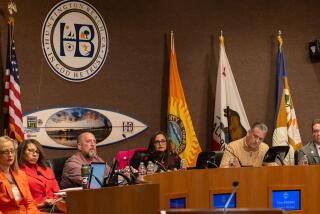Defending Sunset Beach
- Share via
Sunset Beach’s narrow peninsula of nautical shops, tattoo parlors, bars and seafood joints is far removed from the resorts, spas and boutiques of the mini Riviera down the coast of Orange County.
The unincorporated community of 1,200, sandwiched between Huntington Beach to the south and Seal Beach to the north is an anachronism: an unpolished outpost of independent living in Orange County’s sprawl of 3 million people, most of whom live in one of 34 cities.
But for a town that’s nearly off the map, Sunset Beach has sure been making waves.
Told by Orange County officials that they will have to become part of Huntington Beach, residents are resisting. They want to keep their distance from the city of nearly 200,000 they’ve branded a “behemoth” and form their own government.
“Most people want to be left alone and keep the identity of a place that’s off the radar,” said Conan Moats, 35, a high school history teacher. “People live here because they don’t want hype.”
In this proudly independent community, quirks -- from the maritime statues that adorn the roofs of such restaurants as Captain Jack’s and Harpoon Harry’s to perennial flooding and the lack of home mail delivery -- are embraced.
Speculation abounds that if Huntington Beach annexes Sunset, big city development will ensue. Parking meters will sprout up along streets, they fear, followed perhaps by beachfront hotels and resorts -- hallmarks of Surf City.
Huntington “wants to be Waikiki East,” said Tom Burke, a 65-year-old retiree who chairs the local coastal planning board. “We just want to stay the sleepy little beach town that we are. We’re a nugget, and we don’t want to change.”
The fight contrasts with the relaxed pace of life in a place where neighbors often know each other by their first names. “If there’s two Johns, then there’s Mustache John and Longshoreman John,” said Greg Griffin, president of the Sunset Beach Community Assn., the only semblance of local government in town.
Although the idea doesn’t enjoy universal support -- a recent survey of 200 residents, Griffin said, went 2 to 1 in favor of becoming its own city -- the pursuit of independence befits a town with only six traffic lights, a place that ever since being founded more than 100 years ago along a red car line has learned to fend for itself.
The community maintains its own sanitation district and volunteer fire department. Residents raise funds through chili cook-offs and pancake breakfasts. They’ve even dismissed efforts to modernize their mail delivery, preferring to go to the tiny one-clerk post office -- an informal social gathering place -- to pick it up themselves rather than have it delivered to their homes.
When heavy rain and high tides cause flooding in the low-lying peninsula, they stack sand bags and hop in their sea kayaks. When the electricity fails -- at least half a dozen times a year -- they fire up power generators.
As counties try to trim their budgets by shedding unincorporated territory and the responsibilities they entail, outposts like Sunset Beach are being pushed to join cities.
It’s never an easy sell.
In recent years, tiny “island” neighborhoods have resisted being absorbed by surrounding cities by refusing to sign annexation papers. Last year, voters in Rossmoor, a community of 10,000 along the Los Angeles-Orange County line, handily rejected a bid for cityhood.
It has been no different in Sunset Beach.
State law says Huntington Beach could annex an area as small as Sunset without residents having any say. Many residents say that’s unfair. So this summer, leaders concluded that the lesser of two evils was to join Seal Beach, and they told the city of 24,000 to the north that they wanted in. But they were rebuffed; Seal Beach was wary of the expense of taking on new territory.
A few days later the Sunset Beach Community Assn. filed the initial paperwork to become the county’s 35th city.
It’s a long shot, they admit.
The application alone will cost at least $100,000, so each household is being asked to donate $500.
The decision to pursue cityhood came as a surprise to their county supervisor, John Moorlach: “They didn’t even give me a heads-up.”
Moorlach called their desire to form their own city admirable but pointed out obstacles: a limited tax base and a population so small it would place them among the state’s smallest municipalities.
“They’re going against the wind,” he said.
That hasn’t dissuaded people here, who for decades have been dictating their own rules: maximum building heights to safeguard ocean views, twice-a-week trash collection and free beach parking.
At a recent caucus -- held at the Women’s Club, a civic edifice the size of a one-room schoolhouse -- Huntington Beach politicians faced fierce questioning from a crowd spilling out the doorway.
“We’ll become 1,200 votes in a city of 200,000,” said Burke, of the planning commission. “Why would Huntington Beach even want us?”
Keith Bohr, the mayor of Surf City, offered reassurances, saying he would not support annexing Sunset Beach if his city would lose money maintaining it.
“There’s no grand scheme to take over things,” he told the crowd. “We like Sunset Beach the way it is.”
But even Sunset Beach’s most independence-minded concede some sort of change is inevitable.
The community association has hired an attorney and plans to circulate a petition by mail. Twenty-five percent of registered voters -- just a few hundred people -- must sign in order to move forward on the march to cityhood.
Should incorporation fail, leaders have a backup plan: They provided Huntington Beach officials with a list of 13 demands if they opt to annex.
On the top of the list: That “Sunset Beach maintain a separate identity.”
And one more thing: They won’t stand for home mail delivery.
--
More to Read
Sign up for Essential California
The most important California stories and recommendations in your inbox every morning.
You may occasionally receive promotional content from the Los Angeles Times.











